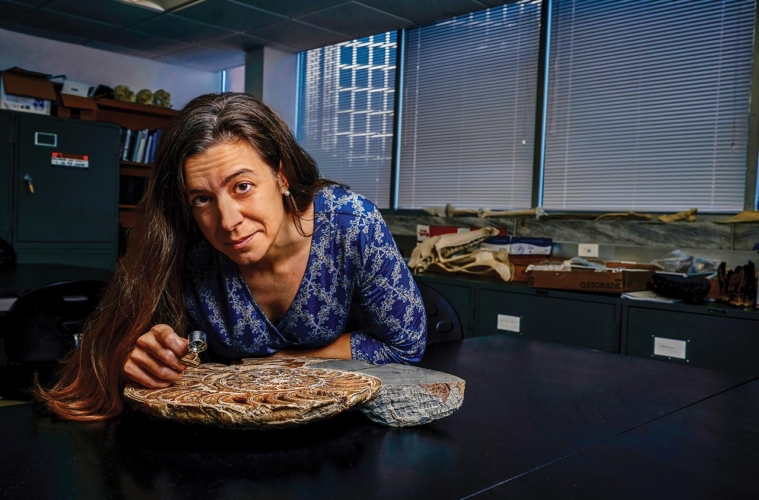Christy Visaggi ’02 finds creative ways to convey her love and knowledge of the ancient earth to others.
Christy Visaggi ’02 was traipsing through a creek at Vicksburg National Military Park in Mississippi when she happened upon a fossil of a trilobite — an arthropod resembling a giant pill bug that lived several hundred million years ago. Visaggi was supervising Megan Rich, her master’s student at Georgia State University, who was in Vicksburg doing work that started through Paleontology in the Parks. That program is Visaggi’s brainchild — a way for students to conduct research on fossils in U.S. national parks.
“I was incredibly excited, and went over to Megan and the park’s natural resources manager, and said, ‘Is this what I think it is?’” Visaggi recalls. She recognized the fossil from her undergrad years at Colgate, when she saw them on outcroppings at Seven Oaks driving range; but this time, it shouldn’t have been found that far south in much younger rocks. “We were all like, ‘This is amazing!’” Eventually, they concluded that the trilobite fossil had ridden down Mississippi creek beds in gravels carried by ancient glaciers from the upper Midwest, adding new evidence to the fossil record of the region.
Visaggi founded Paleontology in the Parks a year and a half ago with the Paleontological Society and the National Park Service as an innovative way to explore an under-examined part of our national heritage and to give students a chance to perform hands-on research. The creative intersection between research and teaching is at the heart of everything Visaggi does as senior lecturer and undergraduate director in geosciences at Georgia State University.
“I enjoy research, but it’s really doing research with people that is fun and exciting,” Visaggi says. “I love guiding students through making discoveries.” Her own passion for paleontology was sparked at age 5 when she found a fossil of a 350-year-old mollusk-like shell in her gravel driveway in New Jersey. She began going on trips with her family to hunt for ancient sea creatures, comparing them to their modern descendants on the Jersey Shore. Visaggi continued that exploration at Colgate under the tutelage of geology professor Connie Soja, who helped her and other students co-author a paper about ancient marine life from Alaska.
“Connie led us in an active exploration of unknowns, where I could contribute to unravelling a mystery … adding a piece to the scientific puzzle,” Visaggi says. She follows that example at Georgia State, where she engages students in her research on marine fossils, including them as authors on papers or presenters at academic conferences. For Visaggi, the fossils aren’t just ancient history; they can also help answer modern-day questions about environmental issues such as climate change and species loss. “Paleontology is not just studying dusty specimens in a museum,” she says. “It has applications to modern conservation issues.” Mastodons, for example, started to die out soon after humans appeared, but paleontologists are still exploring whether it was due to overhunting, disease, or habitat change, and what that might teach us about our own interactions with species.
Visaggi also strives to make earth sciences engaging for Georgia State’s diverse student body, which includes many first-generation students from urban environments. Although there are no fossils exposed in the area, she brings them to downtown Atlanta to show them buildings with fossils in the walls quarried from all over the country.
“I teach with a recognition of culture in mind,” she says. “I talk about how an enslaved individual found a mammoth bone that went on to become the state fossil of South Carolina, or how fossils were used as jewelry in Native American cultures.”
She emphasizes similar cultural connections through parks such as Vicksburg, where English geologist Charles Lyell and French naturalist Charles Lesueur made discoveries providing evidence to help correlate fossils of ancient life across both sides of the Atlantic. “There are so many reasons why it’s important to understand the earth’s history,” she says. “Fossils hold a wealth of information about the past that can ultimately tell us how better to prepare for the future.”
Recent accolades:
- The Geological Society of America honored Visaggi with the Biggs Earth Science Teaching Award, which “recognizes innovative and effective teaching in college-level earth science.”
- She was elected president of the National Association of Geoscience Teachers.
- Visaggi was also recognized for her excellence in education and outreach with an invited lecture award from the American Geophysical Union.

